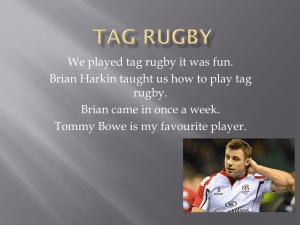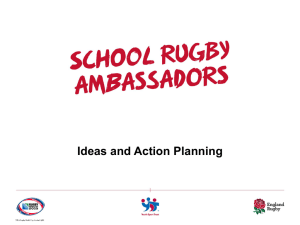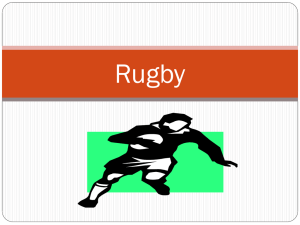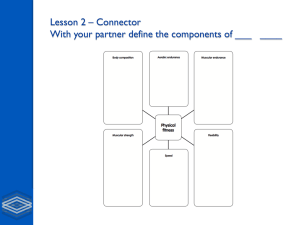Rugby Union
advertisement
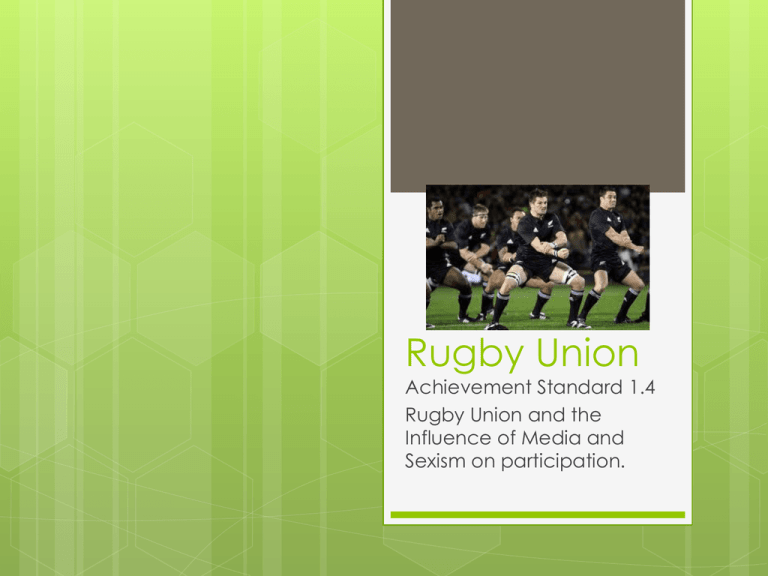
Rugby Union Achievement Standard 1.4 Rugby Union and the Influence of Media and Sexism on participation. Why Rugby Union? It is New Zealand’s national game. It has a lot of stereotypes surrounding it largely due to the influence of the Media. Brainstorm in group’s of 3 or 4: What are some of the stereotypes with Rugby Union? (Note: Stereotypes are assumptions that we make about certain subjects). What are the stereotypes we came up with? Some Ideas….Do You Agree? Rugby is a mans game If you don’t play Rugby (i.e. you play Soccer) you are soft. Rugby players go out and get drunk a lot. Women who play Rugby are butch/lesbian because it is a mans game. EXPLAIN whether or not you agree with these stereotypes. EXPLAIN why you think these stereotypes exist. Watch This: http://www.youtube.com/watch?v=RvUIbqKyppY Did you know… The Black Ferns are the current Women's Rugby World Cup champions. They have won four consecutive World Cups, winning the first International Rugby Board (IRB)sponsored Cup in 1998, the 2002 World Cup in Barcelona, the 2006 World Cup in Edmonton, Canada, and the 2010 World Cup in London, England. Players are AMATEUR. They have jobs and have to pay a lot of their own way. The All Blacks… Have Won 2 World Cups Have had millions of dollars spent on them by the NZ Government and NZRU (Taxpayers) Top players earn 6 figure salaries not counting endorsements. Super XV base salary is around $70’000 plus NPC contract is an additional $20-30’000 (Non All-Blacks) They do not have to pay for travel, accommodation, food etc Is this fair? EXPLAIN WHY/WHY NOT In your own opinion, EXPLAIN why you think their is such a huge gap in the funding? Media Influence. When you watch Rugby on the news only a very small percentage of the coverage is women’s rugby. Why do you think the Media focus is more on the Men than the Women? How does this huge difference in coverage affect the participation levels in the game? TYPES OF MEDIA? Radio Newpaper TV Internet In your opinion Which of these types of Media has the biggest influence on the game of Rugby? EXPLAIN WHY What does this photo tell you? And this one? And again…. So what is the conclusion? MEN MAKE UP THE MAJORITY OF MOST SPORTS PHOTOGRAPHERS! What are the implications of this for the game of Rugby Union in New Zealand? Critical Thinking: NEWSPAPER ANALYSIS OF RUGBY UNION ARTICLE What gender is the writer? What sport is the story about? + What size is the article (small, medium, big)? What gender is the photo of? + Is it a still/posed shot or an action shot? Results Lets out. look at the figures that you worked What are the implications of this in the game of Rugby Union? The Interdependence of Rugby Union and The Media SPORT NEED THE MEDIA AND THE MEDIA NEED SPORT WHY IS THIS??? MEDIA NEED SPORT In order for the media to gain viewers and in turn financial gain they need to provide a product that is visually appealing and that the customers want Considering that the majority of viewers are male, the media seeks to do this through providing hot girls and ‘manly’ men. The Portrayal of Men in Rugby Used to reinforce traditional stereotypes of what is considered to be a male. What is the difference between these photo’s? How does it affect stereotypes and opinions in Rugby Union? What does the Media cover? The Media tend to love showing the “big hits” of the game. Why is this? The Media also tend to show any violence in the game (fights, arguments etc). Again why do you think this is the case? http://www.youtube.com/watch?v=FWILREWptvs EXPLAIN What influence these above factors have on the game? How do they affect participation in the game? The Media Show What we Want to Watch. The issues discussed in the previous page come down to viewer preference. More people watch men’s rugby, therefore the media cover it more. As a result advertisers and sponsors tend to support the men’s form of the game rather than women’s. More people tend to go to men’s games (paying $30-200 for a ticket). This money all trickles down, eventually to the players. What is Sexism in Rugby Union? There is still a long way to go before women receive the same opportunities and support as men. It is a well-known fact that women in professional sports have never been fully supported, either financially or psychologically, by the correct backers. Women have strived to get themselves recognised and respected by governing bodies, media and the public, but sexism in sport is still a huge issue.

